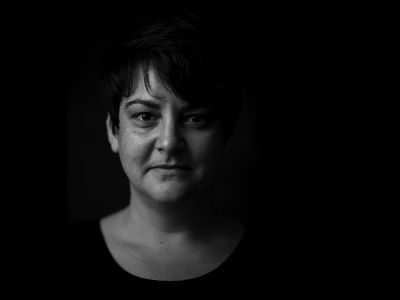Guildhall's Associate Head of Composition (Undergraduate) answers our questions

This month Guildhall School presents concerts with the string quartet Quatuor Bozzini 12 March and vocal ensemble EXAUDI, directed by James Weeks, on 22 March.
Both concerts feature works by members of Guildhall's composition faculty including Cassandra Miller. We caught up with her for a Q&A to find out more.
You’ve been Associate Head of Composition at Guildhall since September 2018. What are you enjoying most about the role?
The students—gorgeous people with beautiful ideas. There’s many things I love about the Guildhall, the collaborative and supportive staff, the feeling that the staff and students are a community of artists growing together, the rigorous learning environment—but above all, it’s a joy like no other to see the students make their colourful discoveries and connections.
We welcome your fellow Canadians Quatuor Bozzini to perform compositions by Guildhall professors on Tuesday 12 March. Why should audiences come and hear their performances?
There are so many reasons. The Quatuor Bozzini are considered one of the most important new-music ensembles in the world. Their nuanced and subtle performances have inspired and nourished an international scene of composers—who in turn write music that resonates with the focus and deep insight that the Bozzinis provide. Listeners will discover an engaging concert that is in equal parts brilliantly colourful and meditative, expansive.
The piece I have written for the concert uses transcriptions of birdsongs, four thrushes in particular. Their songs, when slowed down, sound human. Leo Chadburn has written a gorgeous and enigmatic piece about the categorisation of moths. The works of James Weeks, Paul Newland, and Laurence Crane are intimate and inviting. Reverent attention to the passage of time.
Vocal ensemble EXAUDI perform a programme including the world premiere of your work Rounding at Guildhall on 22 March. Could you tell us a bit about this piece?
Rounding is quite an experiment. I have, over the last three years, developed a type of composing that involves listening to music in headphones and singing-along to that music, while meditating. I call the method ‘automatic singing’. This process is usually done by myself or by a close collaborator in a 1-to-1 session. My score Rounding was commissioned by CoMA for a book of songs which could be performed by amateur choirs, and it is my first attempt at asking a group to participate in ‘automatic singing’. Rounding is based on a recording of the a Sicilian cart driver’s song, which is transformed in many steps of ‘automatic singing’ before the audience will hear it. I’m very excited to hear the results.
Do you have a preference between composing for instrumentalists or vocalists? What are the main differences?
Ah, this is an interesting question. To write for instrumentalists is my native voice, in a way—I have 25 years of training and experience in writing for chamber ensembles and orchestras. I love solo violin, I love string quartet in particular. However, after these last three years of experimenting with automatic singing, I find I use singing in every piece I make now—even if it is just in the starting stages of the composition process for a piece for instruments. For example, I am currently writing a new piece for the Quatuor Bozzini which involves them playing along to a recording of my voice.
What inspires you a composer?
Voices; songs and the physical feeling of a melody; the concentration of a performer on stage; a trance-like engagement with repetition; the moment in a concert when time stretches out like the sea.
What advice would you give for budding composers?
Make friends, make diverse communities. Take joy in your own intellect, share everything you know. Listen to each other more than to your teachers.
Quatuor Bozzini (12 March) and EXAUDI: EXPOSURE2019 (22 March) both take place in the Milton Court Concert Hall. Both events are free, no tickets required. Find out more at www.gsmd.ac.uk/events